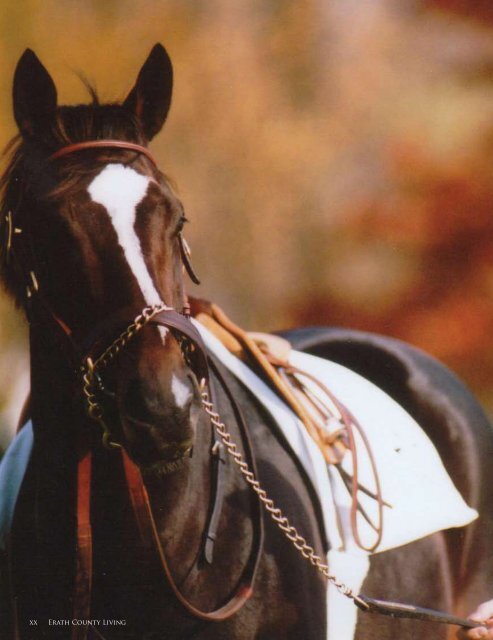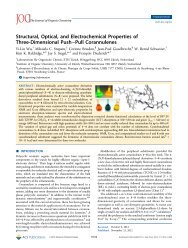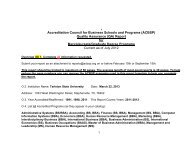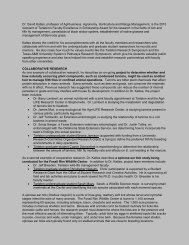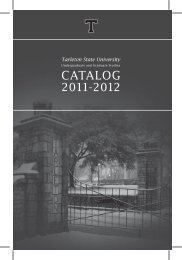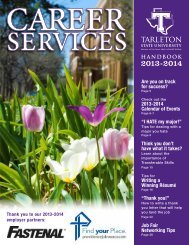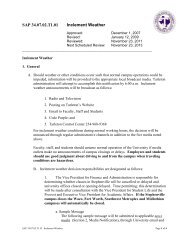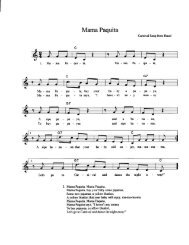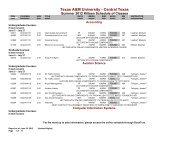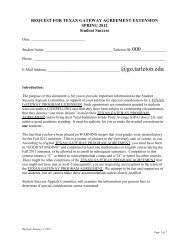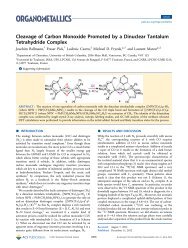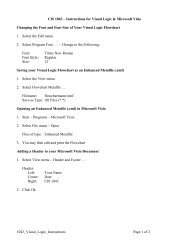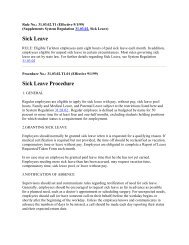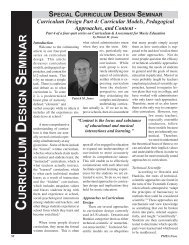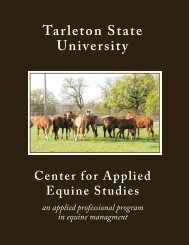Bill Casner - Tarleton State University
Bill Casner - Tarleton State University
Bill Casner - Tarleton State University
Create successful ePaper yourself
Turn your PDF publications into a flip-book with our unique Google optimized e-Paper software.
xx<br />
Erath County Living
<strong>Bill</strong> <strong>Casner</strong><br />
by Phil Riddle<br />
This <strong>Tarleton</strong> graduate is<br />
proof that you can make<br />
a living doing what you love.<br />
Hometown Living At Its Best<br />
xx
ABOVE <strong>Bill</strong> and his wife, Susan.<br />
They have been “happily married” for<br />
35 years. The pair met at a racetrack<br />
where <strong>Casner</strong> worked as a trainer and<br />
Susan worked at the betting window.<br />
They met in May and they were married<br />
in September.<br />
<strong>Bill</strong> Castner grew up in El Paso, Texas where his love of horses developed<br />
at an early age. <strong>Bill</strong>’s first job was galloping horses in Sunland Park when he<br />
was 15; this was the beginning of his love for racing. All of the jobs he has<br />
had since have all just been stepping stones to get him back to the racetrack.<br />
He’s trained horses, owned businesses outside of racing, even became<br />
wealthy as an entrepreneur; but his love for horses has always pulled him<br />
back to the oval.<br />
<strong>Casner</strong> began working as a young teen out of<br />
necessity. His mother, a school teacher, struggled to<br />
take care of an ailing husband and meet the family’s<br />
financial obligations. She passed along a sense of<br />
responsibility to young <strong>Casner</strong>, who took whatever<br />
jobs he could find to pay his way through college.<br />
She also passed on to him a love of education.<br />
He entered <strong>Tarleton</strong> <strong>State</strong> <strong>University</strong> in the fall of<br />
1968 with plans to major in biology and become an<br />
equine veterinarian.<br />
“I went my first semester at school out at the<br />
<strong>University</strong> of Texas- El Paso,” <strong>Casner</strong> said. “A<br />
good friend of mine, Richard Crockett lived in San<br />
Saba. We had talked about going to school there<br />
together and we ended up doing it.” <strong>Casner</strong> did<br />
not shrink from hard labor, taking odd jobs during<br />
the school year to scratch out spending money, but<br />
always returning to Chicago for his summer job at<br />
Arlington Park Racetrack.<br />
“I put myself through college working at the<br />
racetrack,” he said. “I’d gallop horses in the morning<br />
and get a job in the grandstand in the afternoon. I<br />
worked as a security guard one year, I bused tables<br />
one year, I worked in the parking lot, I had a variety<br />
of jobs.” Sometimes <strong>Bill</strong> was even found sleeping<br />
in the tack room to make what little money he had<br />
go a little further. Finally, in 1972 he reached his<br />
goal, graduating with a degree in biology. Taking<br />
his degree he went back to the racetrack where<br />
he became a trainer. “Really, my true love was<br />
the racetrack,” <strong>Casner</strong> readily admitted. “When<br />
I graduated I went back to the racetrack with the<br />
intention of becoming a trainer, which I did. I ended<br />
up training for about six years.”<br />
Just two years removed from Stephenville and <strong>Tarleton</strong>, training race<br />
horses led <strong>Casner</strong> to meet two people who would have a continuing influence<br />
on his life. First, he met his wife, Susan; they have been married for 35 years.<br />
“Happily married for 35 years,” he corrected. Not surprisingly, the pair met<br />
xx<br />
Erath County Living
<strong>Casner</strong> began working<br />
Through the Years... as a young teen out of<br />
necessity. His mother, a<br />
school teacher, struggled to take care of an ailing husband and meet the family’s financial<br />
obligations. She passed along a sense of responsibility to young <strong>Casner</strong>, who<br />
took whatever jobs he could find to pay his way through college. She also passed on<br />
to him a love of education. He entered <strong>Tarleton</strong> <strong>State</strong> <strong>University</strong> in the fall of 1968 with<br />
plans to major in biology and become an equine veterinarian. CLOCKWISE FROM<br />
RIGHT A young <strong>Bill</strong> at age 4. <strong>Bill</strong> in Stephenville, 1970. Janel (sister), <strong>Bill</strong>, and Susan in<br />
front of the childhood log cabin where <strong>Bill</strong>’s mother was born in 1909. The cabin has<br />
been in the family since 1882. <strong>Bill</strong> in his Sophmore year at <strong>Tarleton</strong>.<br />
Hometown Living At Its Best<br />
xx
Excel, worth<br />
$5 billion at<br />
the time of the<br />
initial stock<br />
offering, was<br />
the youngest<br />
company to<br />
ever be traded<br />
on the New<br />
York Stock<br />
Exchange.<br />
at a racetrack where <strong>Casner</strong> worked<br />
as a trainer and Susan worked at<br />
the betting window. They met in<br />
May, and after a summer of trekking<br />
through Europe on $5 a day, they<br />
were married in September. That<br />
same year <strong>Casner</strong> met Kenny Troutt,<br />
who was to become the second more<br />
important person in his life…his<br />
business partner.<br />
But, pardon the pun; racing was<br />
not “stable” enough for <strong>Casner</strong>, who<br />
now had two young daughters to<br />
support. “I left the racetrack when I<br />
was 31 years old,” he said wistfully.<br />
“I had two daughters to raise and<br />
that life was a bit nomadic. I really<br />
wanted to get somewhere I could<br />
have some stability for my family.”<br />
In 1979 he headed back to Texas,<br />
always with an eye for opportunities<br />
to get back into thoroughbred racing.<br />
He purchased a Snap-On Tool<br />
dealership in Waco and about a year<br />
RIGHT <strong>Bill</strong> and Susan <strong>Casner</strong> with President George W. Bush. <strong>Bill</strong> says after taking Excel<br />
public in 1996, “We were very fortunate to be in the right place at the right time with<br />
the right business plan. It was right after telecommunications and long distance had<br />
been deregulated and opened up. We were able to ride that moment in time.”<br />
later, Troutt sold his business and<br />
followed the <strong>Casner</strong>s to the Lone<br />
Star <strong>State</strong>.<br />
“Kenny and I met when we<br />
were both 25 years old in Omaha,<br />
Nebraska,” <strong>Casner</strong> remembers. “He<br />
had a small construction company<br />
and he got some horses and I<br />
trained for him. That’s where we<br />
developed our friendship and our<br />
business relationship. When I left<br />
the racetrack and moved to Texas,<br />
we started trying to see if we could<br />
find a business opportunity to help<br />
us create something significant.”<br />
That opportunity came during<br />
a 1987 conversation between the<br />
friends in which the skeleton of a<br />
billion-dollar company was formed.<br />
Troutt and <strong>Casner</strong> became partners<br />
in Excel Communications, a multilevel<br />
marketing company that<br />
sold telecommunication products,<br />
including long distance telephone<br />
service. Nine years later the<br />
company went public, reportedly<br />
creating more millionaires than<br />
any company in history except<br />
for Microsoft. Excel, worth $5<br />
billion at the time of the initial<br />
stock offering, was the youngest<br />
company to ever be traded on the<br />
New York Stock Exchange. “We<br />
started Excel in 1988,” <strong>Casner</strong><br />
said. “We took it public in 1996.<br />
We were very fortunate to be in the<br />
right place at the right time with<br />
the right business plan. It was right<br />
after telecommunications and long<br />
distance had been deregulated and<br />
opened up. We were able to ride that<br />
moment in time.”<br />
And ride it he did, right back<br />
to his first love horse racing…in<br />
1998 <strong>Casner</strong> and Troutt sold the<br />
company for $3.5 billion wasting<br />
little time getting back into the<br />
horse racing business. In 2000, the<br />
pair bought Prestonwood Farm in<br />
Versailles, Kentucky and renamed it<br />
WinStar. They have about 65 horses<br />
xx<br />
Erath County Living
RIGHT <strong>Bill</strong> and his wife, Susan in 1975. BELOW<br />
The <strong>Casner</strong> family in 1982. BOTTOM 1980<br />
when <strong>Bill</strong> became a Snap-On Tools dealer.<br />
Hometown Living At Its Best<br />
xx
TOP The Troutt and <strong>Casner</strong> families at the Kentucky Derby.<br />
ABOVE The Churchhill Downs races. BOTTOM <strong>Bill</strong> participating<br />
in an ARHFA team roping event. OPPOSITE PAGE<br />
<strong>Bill</strong> and his family on vacation.<br />
“The education I received<br />
at <strong>Tarleton</strong> was top notch.<br />
They had very high-quality<br />
professors, the curriculum<br />
was very, very good.”<br />
[<strong>Bill</strong> <strong>Casner</strong>]<br />
in training there, along with two of the top studs in the<br />
industry, Tiznow and Distorted Humor.<br />
It was the latter that put WinStar Farms on the<br />
thoroughbred-racing map, siring Funny Cide, the 2003<br />
Kentucky Derby winner. “Funny Cide was the horse that<br />
really launched WinStar Farms,” <strong>Casner</strong> beamed. “He was<br />
in the first crop of Distorted Humor and really launched<br />
Distorted Humor as a sire and gave us the opportunity<br />
to grow.” In 2010, Run for the Roses featured another<br />
WinStar-bred winner. “Super Saver is home-bred. We<br />
raised him,” he said. “He was the first time we went to the<br />
winner’s circle as owners.”<br />
In spite of all his success, <strong>Casner</strong> has not been immune<br />
to heartache. His 23-year-old daughter was killed in a 2002<br />
terrorist bombing while visiting Bali. Kerri was vacationing<br />
alone in Indonesia when a car bomb ripped through a row<br />
of discotheques where she was found. “She lived so much<br />
more than most people ever live in a lifetime and gave so<br />
much to so many people,” <strong>Bill</strong> <strong>Casner</strong> told a Vail, Colorado<br />
newspaper following the attack. “She left so many people<br />
xx<br />
Erath County Living
with so much. She made us all<br />
better, and that’s her number one<br />
legacy.”<br />
Though now a gentleman farmer<br />
in a business where millions of<br />
dollars can ride on a single foal,<br />
<strong>Casner</strong> still has a deep, abiding love<br />
for the animals he raises. “I think<br />
most people in the business truly<br />
revere the horse,” <strong>Casner</strong> said. “The<br />
horse is one of God’s greatest gifts<br />
to us, a phenomenal animal. It never<br />
ceases to amaze me how willing a<br />
horse is to do whatever we ask of<br />
him.” “Then, of course,” he added,<br />
“there are those individual horses<br />
that become very, very special to<br />
you.”<br />
<strong>Casner</strong> still spends as much time<br />
as possible in the saddle. He splits<br />
time between his Texas ranch and<br />
WinStar Farms in the Bluegrass<br />
<strong>State</strong>. “I love both places,” he said.<br />
“When I’m in Texas I’m on the back<br />
of a horse and I’m roping. When I’m<br />
in Kentucky I’m heavily involved in<br />
the business of WinStar.” “I’ve got<br />
165 acres in Flower Mound, Texas<br />
and about 30 horses on my place<br />
there,” <strong>Casner</strong> said. “I team rope as<br />
well, that’s another passion of mine.<br />
I love to get on a horse and I love to<br />
compete.”<br />
<strong>Casner</strong> is quick to point to<br />
the importance of his <strong>Tarleton</strong><br />
experiences in his success. “The<br />
education I received at <strong>Tarleton</strong><br />
was top notch,” he said. “They had<br />
very high-quality professors, the<br />
curriculum was very, very good.<br />
I’ve continued to have an interest<br />
in science all my life. Of course,<br />
that was inspired by and fueled<br />
at <strong>Tarleton</strong>.” He said his TSU<br />
education comes in handy daily<br />
as he strives to breed better, faster<br />
horses and stronger bloodlines.<br />
“I’ve continued to use science as<br />
an integral part of the WinStar<br />
program,” <strong>Casner</strong> said. “We’re<br />
always looking for new and<br />
innovative, novel ways that come<br />
out of science that we can use to<br />
move our program forward. One of<br />
the keys to the success of WinStar<br />
is that we’re always looking for<br />
a better way. We have a saying,<br />
‘If you’re doing the same thing<br />
tomorrow you’re doing today, you’re<br />
not moving forward.’ Certainly the<br />
education I got at <strong>Tarleton</strong> gave me<br />
the foundation to understand science<br />
and its significance.”<br />
Breeding a pair of Kentucky<br />
Derby winners has also gained<br />
<strong>Casner</strong> recognition among his racing<br />
peers. He has served as chairman<br />
of the Thoroughbred Owners and<br />
Breeders Association and he is the<br />
co-founder and chairman of the<br />
Kentucky Equine Education Project.<br />
In addition, <strong>Casner</strong> received the<br />
Thoroughbred Charities of America<br />
Leadership Award in 2007, the<br />
2005 W.T. Young Humanitarian<br />
Award and the 2003 Thoroughbred<br />
Breeders and Breeders Association<br />
Industry Service Award. He is also<br />
a founding member of the National<br />
Scholarship Foundation providing<br />
educational opportunities to children<br />
of behind-the-scenes racetrack<br />
workers.<br />
That’s an impressive resume, to<br />
be sure, but he says there is more to<br />
come. “We’re going to continue to<br />
grow and try to produce some of the<br />
best horses in the world,” he said.<br />
“We feel like we’ve only started.<br />
I’d love to win the Kentucky Derby<br />
numerous times. The cornerstone<br />
of our business plan is developing<br />
stallions. We’re always trying to<br />
develop world-class stallions that<br />
will further the breed.” ECL<br />
Hometown Living At Its Best<br />
xx


